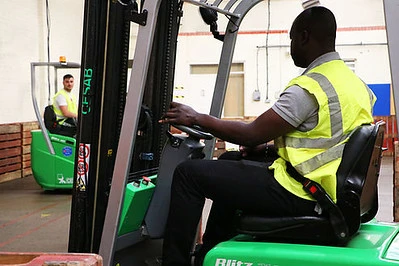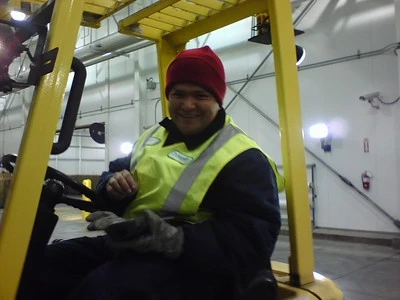Who Can Do Forklift Training (5 Pros Who Can Do This)
April 3, 2024 | by onlineoshasafetytraining.com


Let’s answer this question by highlighting an inquiry of Robert R. Brant dated July 3, 2003.
An inquiry was made to OSHA regarding the qualifications needed for individuals to train PIT operators, specifically asking what is meant by the term “experience” in the regulation 29 CFR 1910.178(l)(2)(iii). This regulation mandates that all training and evaluation for PIT operators must be conducted by individuals who possess the necessary knowledge, training, and experience.
The scenario provided highlighted that some driver instructor examiners, certified to teach PIT operator training, do not regularly operate PITs as part of their job functions.
OSHA clarified that the term “experience” refers to the trainer’s ability to operate the powered industrial truck safely in the employer’s workplace, possessing practical skills and judgment. This includes familiarity with specific equipment and attachments used in the workplace. However, it was noted that the standard does not require trainers to operate a PIT regularly outside of their training duties. The essential criterion is that trainers must have the experience necessary to safely operate the equipment and train others under the specific conditions of the employer’s workplace.
Who Are Those People Qualified Who Can Do The Training
Citing specific individuals or persons responsible for conducting powered industrial truck (PIT) operator training and evaluation, as required by OSHA standards (specifically, 29 CFR 1910.178(l)(2)(iii)), involves identifying those with a unique combination of qualifications. These qualifications include knowledge of PIT operation, formal training on how to teach PIT operation, and practical experience with PITs. While we can’t reference specific current individuals due to the variability and privacy concerns across workplaces, we can outline the types of professionals typically involved in such roles:
- Safety Trainers and Consultants – Professionals specializing in workplace safety and specifically certified in PIT operation and training. They often have extensive experience in various types of PITs and are well-versed in adult education techniques.
- Experienced PIT Operators – Senior PIT operators with years of operational experience who have undergone additional training to teach and evaluate new operators. These individuals not only bring practical experience but also insights into the nuances of safe operation under different conditions.
- Industrial Training Specialists – Individuals who specialize in creating and delivering training programs across various industrial operations, including PIT operation. They usually have a background in industrial psychology, education, or human resources, with specific certifications in equipment operation and safety training.
- Safety Compliance Officers – In larger organizations, these are individuals responsible for ensuring that all operational training, including PIT training, complies with OSHA regulations and other safety standards. They might also directly participate in the training and evaluation process.
- Vocational Educators – Educators in vocational schools or technical colleges who specialize in logistics, warehousing, and industrial operations may also be qualified to train and evaluate PIT operators. These professionals often have both academic credentials and practical experience in the field.
These roles underscore the importance of a comprehensive skill set for those responsible for PIT operator training and evaluation, ensuring that operators are effectively trained in safe operation practices and evaluated for their competence in a manner compliant with OSHA standards.
Is Online Forklift Training Providers Qualified to Provide Training
Online forklift training providers can offer a convenient and flexible option for learning theoretical aspects of forklift operation, including safety guidelines, operational principles, and legal requirements. However, the question of whether these providers are qualified to offer comprehensive forklift training involves several considerations:
1. Theoretical Knowledge vs. Practical Skills
- Theoretical Training: Online courses are well-suited to deliver the theoretical knowledge required for forklift operation. This includes understanding OSHA regulations (or equivalent standards outside the USA), safety practices, forklift mechanics, and load management principles.
- Practical Skills: Operating a forklift safely requires hands-on experience that cannot be fully acquired through online courses. Practical skills such as maneuvering, load handling, and equipment inspection are critical and typically require in-person training under the guidance of a qualified instructor.
2. Certification and Compliance
- OSHA Requirements: In the United States, OSHA standards specify that forklift operators must receive training that includes formal instruction (e.g., lecture, video, interactive online training), practical training (demonstrations and exercises), and an evaluation of the operator’s performance in the workplace. While online courses can fulfill the formal instruction component, they cannot meet the requirements for practical training and evaluation.
- Accreditation: The quality and legitimacy of online forklift training providers can vary. Potential students should look for programs accredited by recognized safety organizations or that comply with relevant local, state, and federal regulations.
3. Employer Responsibility
- Practical Evaluation: Even if an employee completes an online forklift training course, employers are responsible for ensuring that the operator can safely handle a forklift in their specific work environment. This includes a practical evaluation and additional training on the specific types of forklifts and attachments they will be using, as well as navigation in the actual workplace setting.
- Customized Training: Employers often need to supplement online training with additional instruction that addresses the specific conditions and safety concerns of their workplaces.
4. Limitations and Advantages
- Limitations: The main limitation of online forklift training is the lack of practical, hands-on experience. Forklift operation is a skill that requires physical practice to master.
- Advantages: Online training courses offer flexibility and accessibility, allowing individuals to complete theoretical components at their own pace and convenience. This can be particularly beneficial for refreshing knowledge or for initial instruction before undergoing practical training.
While online forklift training providers can offer valuable theoretical knowledge and serve as a useful component of a comprehensive training program, they cannot fully replace in-person, practical training sessions led by qualified instructors. Employers must ensure that operators receive both forms of training to meet regulatory requirements and to maintain a safe working environment.
Do You Know You Can Designate an Employee Who Can Do The Training
Yes, designating an employee to become a forklift train-the-trainer is a widely recognized practice that can be highly effective for organizations looking to internalize their forklift operator training programs. This approach involves selecting a capable employee, preferably someone with experience and a strong safety mindset, to undergo specialized training that enables them to instruct other employees in forklift operation. Here’s how it works and why it can be beneficial:
How it Works
Selection
Criteria for Selection:
- Experience: A minimum threshold of operational hours (e.g., at least 100-200 hours) of direct forklift operation, demonstrating a broad range of experience with different models and situations.
- Safety Record: An exemplary safety record, with no violations or accidents within a specified period (e.g., the past 12-24 months).
- Communication Skills: Assessment of communication skills could involve evaluations by supervisors or a structured interview process to gauge the ability to convey information clearly and effectively.
Train-the-Trainer Course
Course Structure:
- Duration: The course typically spans several days, often between 3 to 5 days, depending on the comprehensiveness of the curriculum.
- Content: It covers advanced forklift operation techniques, in-depth safety protocols (covering both OSHA standards and any specific regulations pertinent to the location or industry), and instructional strategies for adult learners. This includes understanding different learning styles, how to create and manage a training environment, and assessment methods.
- Technicalities: Detailed exploration of forklift mechanics and maintenance, understanding load dynamics and the physics of forklift operations (such as calculating load centers, understanding the stability triangle, and the effects of lifting different types of loads at various heights and angles).
- Assessment Methods: Trainers learn to design and administer both written tests and practical evaluations, setting benchmarks for competence that include accuracy in maneuvering, adherence to safety practices, and the ability to perform under different operational scenarios.
Certification
Components of Certification:
- Written Examination: A comprehensive test covering theoretical knowledge of forklift operations, safety standards, and teaching methodologies. A passing score might be set at a stringent percentage, such as 80% or higher.
- Practical Demonstration: A practical exam where the candidate must demonstrate their ability to safely operate a forklift through various maneuvers, potentially including navigating obstacle courses, precise loading and unloading, and emergency procedures.
- Teaching Assessment: The candidate may also be required to conduct a sample training session or present a training plan, evaluated on their ability to convey information effectively, engage learners, and accurately assess learners’ abilities.
- Renewal and Continuing Education: Certification might have a validity period (e.g., 3-5 years) after which the trainer must undergo recertification, which can include updates on the latest safety standards, forklift technologies, and teaching methods.
Benefits
- Customized Training: An in-house trainer can tailor the training program to address the specific operational needs and safety concerns of the workplace, making the training more relevant and effective.
- Flexibility: Having an internal trainer provides the organization with the flexibility to schedule training sessions according to the workflow and availability of employees, without depending on external schedules.
- Cost-Effectiveness: While there is an initial investment in the train-the-trainer course, over time, having an internal trainer can reduce the costs associated with hiring external trainers for each new batch of employees needing certification or recertification.
- Consistency: An internal trainer ensures consistency in training delivery, reinforcing the organization’s safety culture and operational procedures across all levels of forklift operation.
That Employee Take The Online Forklift Train-Trainer Course
You can enroll your employee in an online forklift train-the-trainer course to equip them with the necessary skills and knowledge to conduct forklift training within your organization.
This online course will cover essential topics such as forklift operation safety standards, effective teaching methods tailored for adult learners, and the mechanics of different types of forklifts. Through a blend of interactive modules, video tutorials, and virtual assessments, the employee will learn not just how to operate a forklift safely but also how to pass on this critical knowledge to other employees.
On completing the course, they will receive a certification, allowing them to officially conduct forklift training sessions, evaluate operator competence, and ensure adherence to workplace safety protocols and regulations. This approach not only fosters a culture of safety within the organization but also streamlines the training process by leveraging internal resources.
If you’re in search of a reliable online provider for the forklift train-the-trainer course, www.forklifttraining.com is a recommended option. This platform specializes in offering comprehensive forklift training solutions, including train-the-trainer programs designed to certify employees to conduct forklift training internally within your organization. Their courses are structured to provide a thorough understanding of forklift safety, operation, and instructional techniques, all delivered through an accessible online format. By choosing forklifttraining.com, you’ll be equipping your designated employee with the knowledge and tools necessary to develop a skilled, safety-conscious forklift operating team.
To Make a Conclusion
Forklift training can be undertaken by a wide range of individuals, from warehouse workers and logistics personnel to construction and manufacturing employees. With options like online courses and the ability to designate an in-house employee through train-the-trainer programs, organizations have flexible paths to ensure their teams are proficient in forklift operation.
Ensuring trainers have the necessary knowledge, experience, and certification, whether through direct operation or comprehensive courses like those offered by forklifttraining.com, is essential for maintaining safety and efficiency in any setting where forklifts are used.
This approach not only fosters a safer workplace by equipping operators with the skills needed to handle forklifts carefully but also enhances operational efficiency and productivity. By investing in thorough and accessible training programs, companies can build a reliable team of forklift operators and trainers, ensuring that the standards of safety and competence are continuously met and upheld.
RELATED POSTS
View all


